UK inflation rate unchanged at 4% in January as Jeremy Hunt insists ‘plan is working’ – live
The rate of Consumer Prices Index inflation unexpectedly remained at 4% in January, unchanged from December, the Office for National Statistics said.
Experts had expected inflation to rise, but after the news on Wednesday morning that the rate has held, chancellor Jeremy Hunt said the government’s “plan was working”.
However, while inflation is still down from a 41-year high of 11.1 per cent in October 2022 to below prime minister Rishi Sunak’s stated goal of 5 per cent by the end of 2023, it remains above the Bank of England’s longstanding target of 2 per cent.
Mr Hunt said: “Inflation never falls in a perfect straight line, but the plan is working; we have made huge progress in bringing inflation down from 11%, and the Bank of England forecast that it will fall to around 2% in a matter of months.”
Economists will be watching keenly for signs on what impact the figures could have on the Bank of England’s base interest rate, which is causing pain for borrowers and homeowners struggling with higher mortgage rates.
Key Points
Rate still expected to fall to 2% target in months
Inflation remained unchanged at 4% in January
Inflation expected to have risen for second month in a row
New ONS data could deal political blow to Sunak and Hunt
13:18 , Matt Mathers
We’re wrapping up our live coverage of today’s inflation figures.
Thanks for reading and join us again soon for all the latest updates on the economy.
Have a good rest of the afternoon.
Tuesday 13 February 2024 18:56 , Andy Gregory
Good evening, we’ll be using this blog to provide you with live updates as the Office for National Statistics publishes fresh monthly data on the rate of inflation.
Inflation expected to have risen for second month in a row
Tuesday 13 February 2024 18:57 , Andy Gregory
New data from the Office for National Statistics on Wednesday could show that inflation rose for the second month in a row.
Economists expect the figures will show that Consumer Prices Index inflation – a measure of the costs that households face – rose from 4.0 per cent in December to 4.2 per cent in January.
It would be a blow for households because their costs are rising faster than at the end of last year, although inflation is still less than half where it was a year ago.
Rising inflation could deal political blow to Sunak and Hunt
Tuesday 13 February 2024 19:01 , Andy Gregory
The Chancellor is expected to be dealt a blow as new data on Wednesday could show that inflation rose for the second month in a row.
If inflation rises to 4.2 per cent as is expected, it could also hurt the government's promises to help households out by getting inflation under control.
However, this is only likely to be a short-term blip before inflation begins to fall again.
How has the rate of inflation changed in recent years?
Tuesday 13 February 2024 19:50 , Andy Gregory
This graphic by the PA news agency charts the rate of inflation as recorded in recent years by the Office for National Statistics:

Inflation still likely to have fallen in February, economist says
Tuesday 13 February 2024 20:47 , Andy Gregory
Despite an expected blip in Wedesday’s figures, inflation could fall as low as 3.4 per cent in February, an economist has said.
Samuel Tombs, the chief UK economist at Pantheon Macroeconomics who believes that inflation hit 4.1 per cet in January, said that regardless of Wednesday’s data, inflation is likely to fall considerably, to 3.4 per cent, this month.
What’s happening to your mortgage as major lender hikes rates ahead of inflation announcement
Tuesday 13 February 2024 21:41 , Andy Gregory
It’s been a turbulent few days for prospective and current homeowners looking for mortgages, with several major lenders announcing increases in rates after a period of decline in borrowing costs.
Nationwide, the country’s biggest building society, revealed its mortgage rates would rise by up to 0.25 percentage points on Tuesday. It comes after lenders Halifax and TSB said they were also raising rates on some of their products.
But, strangely, other lenders have gone in the other direction. Santander has announced mortgage rate cuts of 0.16 percentage points.
The mixed picture for mortgage rates comes after the Bank of England held its base rate at 5.25 per cent earlier this month. However, it is Wednesday’s release of inflation figures which appear to have resulted in what some brokers are calling a “yo-yo” market.
My colleague Alex Ross reports:

What’s happening to your mortgage as lender hikes rates ahead of inflation statement
Why have mortgage rates gone up?
Tuesday 13 February 2024 22:39 , Andy Gregory
Following a period of decline in borrowing costs, several major mortgage lenders have announced increases in rates in recent days, my colleague Alex Ross reports.
Mortgage rates are closely tied to swap rates, which is effectively the rate the lenders pay a financial institution for funding, and that is affected by the Bank of England’s base interest rate and inflation.
Tomorrow, experts believe inflation will go up marginally from the annual 4 per cent recorded last month.
Ken James, director at Contractor Mortgage Services, told The Independent: “Lenders at the moment are pricing in potential inflation rises.
“I think what they are doing is safeguarding. They are saying ‘we think that everything is going to rise with all these figures coming in and therefore let’s partly protect ourselves against that future rise and get it in early’.
“I think with tomorrow, because I’m pretty confident rates are going to rise with inflation, I think lenders have just done it early, I think they are just protecting themselves.”
How will new inflation figures impact on the Bank of England’s base interest rate?
Tuesday 13 February 2024 23:36 , Andy Gregory
Economists will be tracking the data to try to figure out what influence it might have on the Bank of England.
The Bank’s Monetary Policy Committee (MPC) is tasked with keeping inflation as close to 2 per cent as possible.
One of the main ways it has to do this is by changing interest rates. By increasing rates it restricts the amount of money that mortgage holders have to spend, therefore reducing demand for goods and services. That can help take pressure off prices.
So if inflation is higher than the 4.1 per cent the MPC expected in its last forecast, that could make rate setters more likely to delay cuts to the base rate.
Wage rise data could also impact inflation and interest rates
00:31 , Andy Gregory
The higher-than-expected wage rises in Tuesday’s Office for National Statistics figures will also spark worries of delayed cuts to the Bank of England’s base interest rate – given that wage rises can push up inflation.
“Today’s wage rises contribute to tomorrow’s spending power, impacting demand and influencing inflation, so the Bank will be keenly monitoring average earnings growth in particular,” said Rob Morgan, chief investment analyst at Charles Stanley.
“Resilient wages have been a driver of sticky consumer price inflation, and they are not falling back into line as fast as the BoE (Bank of England) would like as it looks to return inflation to the 2 per cent target.
“What’s more, a further inflationary impulse could lie in wait in the form of an increase to the national minimum wage of almost 10 per cent from April, which stands to simultaneously increase costs for employers and bolster household spending power, potentially exerting further upward pressure on prices.”
What has been happening to wages?
01:33 , Andy Gregory
Wage growth has slowed to its lowest level for more than a year but is still outpacing inflation, according to official figures.
The Office for National Statistics (ONS) said average regular pay growth, excluding bonuses, fell to 6.2% in the quarter to December, down from an upwardly revised 6.7 per cent in the three months to November.
This was the slowest growth since the three months to October 2022.
But when taking Consumer Prices Index (CPI) inflation into account, real regular wages rose by 1.9 per cent – a high since summer 2019, excluding the pandemic-skewed years.
This is thanks to inflation having fallen back sharply after hitting an eye-watering 41-year high of 11.1 per cent seen in October 2022.
But the fall in wage growth was less than expected by most experts and in financial markets, with investors reining in their bets on interest rate cuts this year after the data.
FTSE 100 drops as interest rate concerns weigh on housebuilders
02:39 , Andy Gregory
London’s markets slid in a gloomy afternoon session amid concerns over persistent inflation, reports Henry Saker-Clark.
The FTSE 100 had a cautious morning of trading but quickly dropped to its lowest point this month after hotter-than-expected US Consumer Price Index (CPI) inflation figures.
The data suggested hopes of interest rate reductions soon could be premature and particularly dented housebuilders amid concerns about the mortgage market.
London’s top index moved 0.81 per cent, or 61.41 points, lower to finish at 7,512.28, with Taylor Wimpey, Barratt Developments and Persimmon all notable fallers.

FTSE 100 drops as interest rate concerns weigh on housebuilders
Watch: Hunt insists plan to bring inflation down is working
03:44 , Andy Gregory
United States inflation falls – but by less than forecast
04:50 , Andy Gregory
On Tuesday, figures from the US showed that inflation slowed to 3.1 per cent from 3.4 per cent earlier, but the slowdown was less than the drop to 2.9 per cent that had been expected.
Axel Rudolph, senior market analyst at IG, said: “A higher-than-expected US CPI print provoked a sell-off in global equities as rate cut expectations are pushed back.”
Advice for homeowners as some mortgage rates rise
05:56 , Andy Gregory
With some mortgage rates rising ahead of the inflation figures on Wednesday, the market is volatile and homeowners on variable rates, or those coming off fixed rates, will be wondering if they should go for a new mortgage product with a rate, or stick at their lender’s variable rate in the hope that rates will go down later in the year.
Ken James, director at Contractor Mortgage Services, told The Independent: “It varies from person to person ... are they on a variable rate because they are looking to sell, are they waiting for prices to fall and don’t want to lock into anything now because they feel the prices are high and they want to see if they can get a cheaper deal?
“The downside to that is whilst they are sitting on the fence, it’s costing them as the variable rates are extremely high.
“So the conversation we are having at the moment is is there a halfway house where they can mitigate the increase of the variable rate, but not getting stuck into a fix?
“The halfway house of course now is tracker rates, so a lot more people now are contemplating if tracker rates might be the right way to go. It’s not as cheap as a fixed but it’s not tied to a variable. Maybe go on a tracker rate and ride the storm and see where it takes us.”
My colleague Alex Ross has more in this report:

What’s happening to your mortgage as lender hikes rates ahead of inflation statement
Full report: Wage growth slows to lowest level in more than a year
06:59 , Andy Gregory
While all eyes are on today’s new inflation figures, data released earlier this week also suggested that UK wage growth had slowed to its lowest level for more than a year, while vacancies also fell back once again as Britain’s jobs market cools further.
The Office for National Statistics (ONS) said average regular pay, excluding bonuses, fell to 6.2 per cent in the quarter to December, down from an upwardly revised 6.7 per cent in the three months to November. This was the slowest growth seen since the three months to October 2022.
But when taking Consumer Prices Index (CPI) inflation into account, real regular wages rose by 1.9 per cent – a high since summer 2019, excluding the pandemic-skewed years.
This is thanks to inflation having fallen back sharply from the 41-year high of 11.1 per cent seen in October 2022. Holly Williams has the full report:

Wage growth slows to lowest level in more than a year – ONS
Inflation stays at 4%
07:04 , Matt Mathers
Inflation has stayed at 4 per cent after rising in December, official figures show.
Office for National Statistics figures published on Wednesday morning showed the Consumer Prices Index was at 4 per cent in January.
Frozen inflation rate shows cost of living crisis far from over
07:07 , Matt Mathers
The frozen inflation rate will serve as a stark reminder that the cost of living crisis is not yet over after Rishi Sunak said that the UK economy had “turned a corner”.
As recently as Monday, the prime minister said that the economy was “heading in the right direction” but the frozen rate shows there remains work to do.
And separate data to be published on Thursday could show that the UK has entered a recession after gloomy figures released last month showed that retailers suffered a dire Christmas as families cut back on spending amid the cost of living crisis.
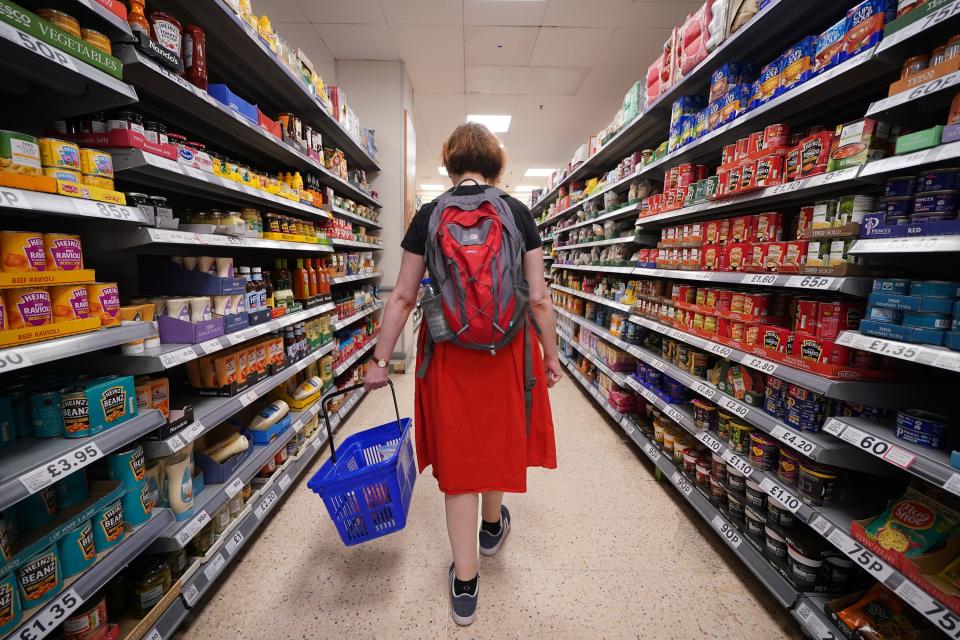
Inflation remains double Bank of England target
07:09 , Matt Mathers
The prime minister entered Downing Street in October 2020 promising to halve inflation by the end of last year; a target that he met.
But although the rate stayed stable in January and is less than half of what it was at its peak of 11 per cent, it remains more than double the Bank of England’s target of 2 per cent.
Fears have also been growing that attacks in the Red Sea, which serves as the entry point to the Suez Canal, one of the world’s busiest shipping lanes, could drive up the price of oil and gas.
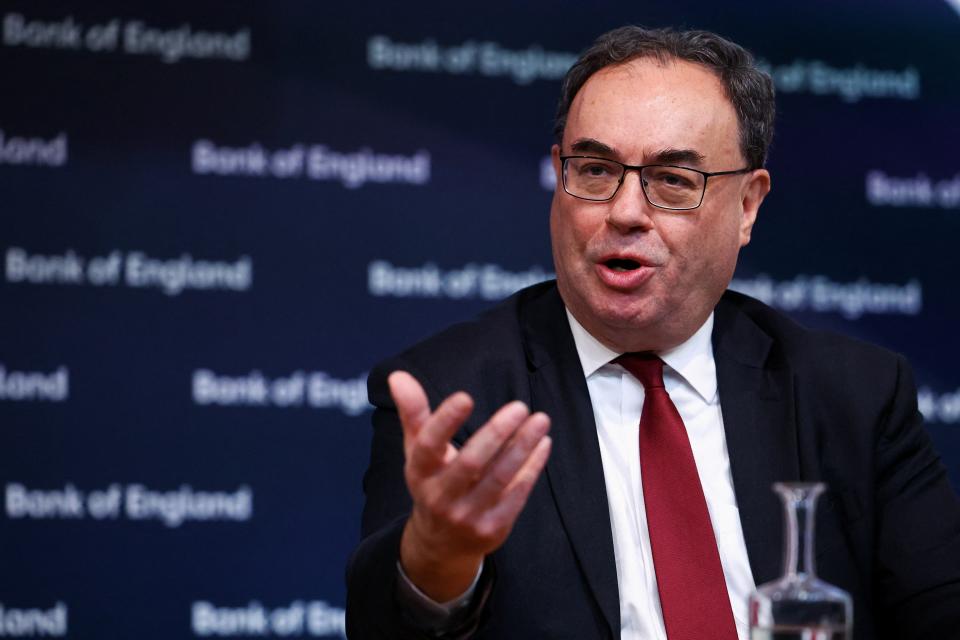
2 per cent inflation target will be met in months - chancellor
07:11 , Matt Mathers
Jeremy Hunt has said the Bank of England will meet its inflation target of 2 per cent in a matter of months.
The chancellor said: “Inflation never falls in a perfect straight line, but the plan is working; we have made huge progress in bringing inflation down from 11 per cent, and the Bank of England forecast that it will fall to around 2 per cent in a matter of months.”
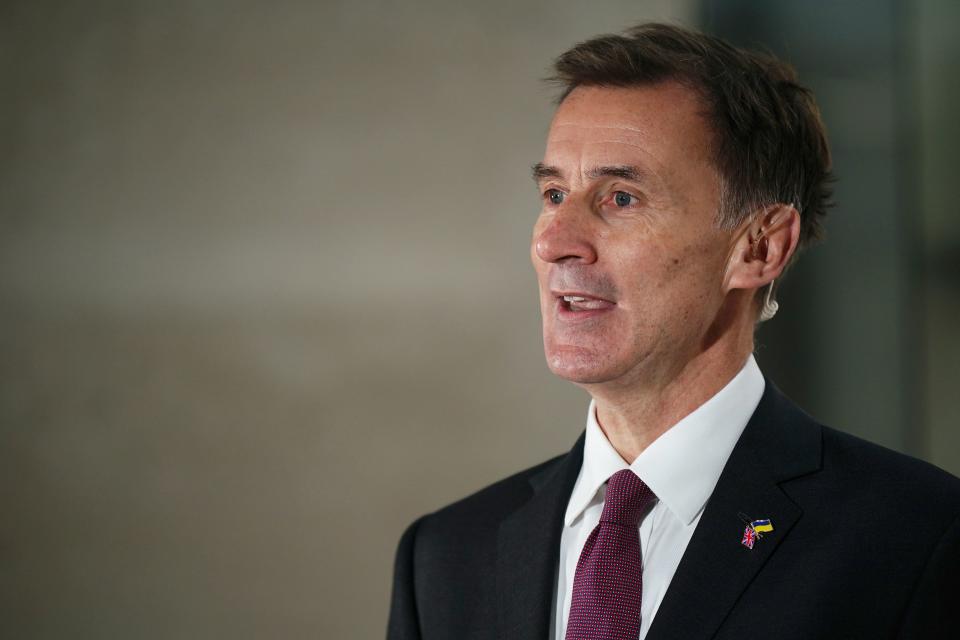
Millions of families still struggling - Labour
07:19 , Matt Mathers
Shadow chancellor Rachel Reeves said: “After 14 years of economic failure working people are worse off. Prices are still rising in the shops, with the average household’s costs up £110-a-week compared to before the last election.
“Inflation is still higher than the Bank of England’s target and millions of families are struggling with the cost of living.
“The Conservatives cannot fix the economy because they are the reason it is broken. It’s time for change. Only Labour has a long-term plan to get Britain’s future back by delivering more jobs, more investment and cheaper bills.”
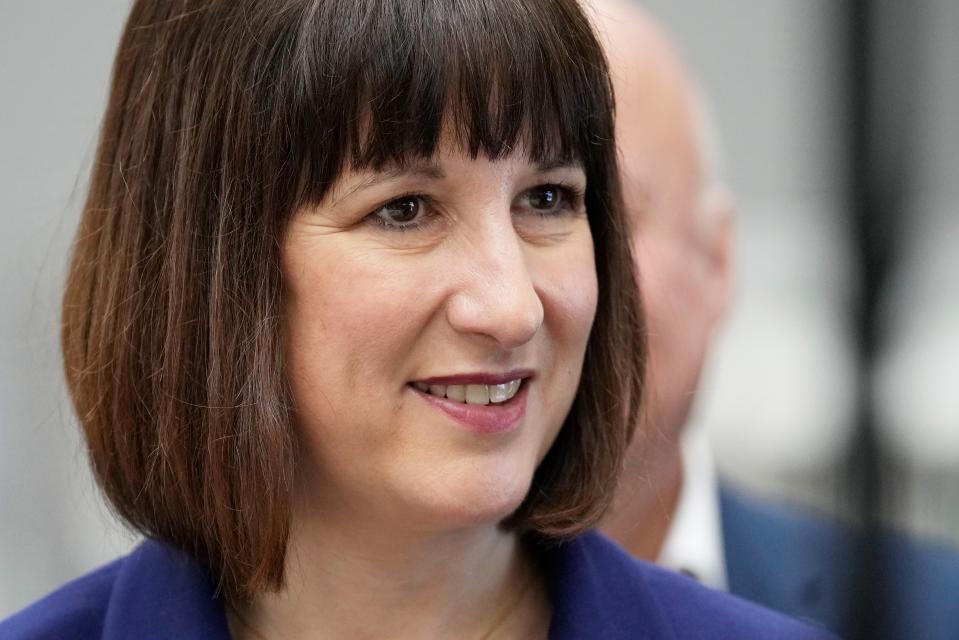
Falling furniture and household goods prices keep inflation at 4%
07:26 , Matt Mathers
Falling furniture and household goods prices helped to keep inflation at 4 per cent, the Office for National Statistics said.
The ONS said food prices fell on a monthly basis for the first time since September 2021, and the largest downward push on inflation came from furniture and household goods.
ONS chief economist Grant Fitzner said: “Inflation was unchanged in January, reflecting counteracting effects within the basket of goods and services.
“The price of gas and electricity rose at a higher rate than this time last year due to the increase in the energy price cap, while the cost of second-hand cars went up for the first time since May.
“Offsetting these, prices of furniture and household goods decreased by more than a year ago and food prices fell on the month for the first time in over two years.
“All of these factors combined resulted in no change to the headline rate this month.”
For many, wages still have come catching up to do - think tank
07:38 , Matt Mathers
Reacting to today’s monthly inflation figures Dr George Dibb, associate director for economic policy at the Institute for Public Policy Research, said: “This announcement that inflation is still not falling is likely just a blip, with the rate expected to come down again over the next few months, but prices are still rising and it’s a salutary reminder of the continuing cost that many working people have paid.
“We can expect the Bank of England to start lowering interest rates this year, but for many, wages still have some catching up to do.
“And the gap between benefit levels and a living income remains stratospheric. This is the wrong time for the government to talk about cutting taxes. Instead it should prioritise fixing public services in order to underpin the economic growth that is needed to ensure sustainably rising wages.”
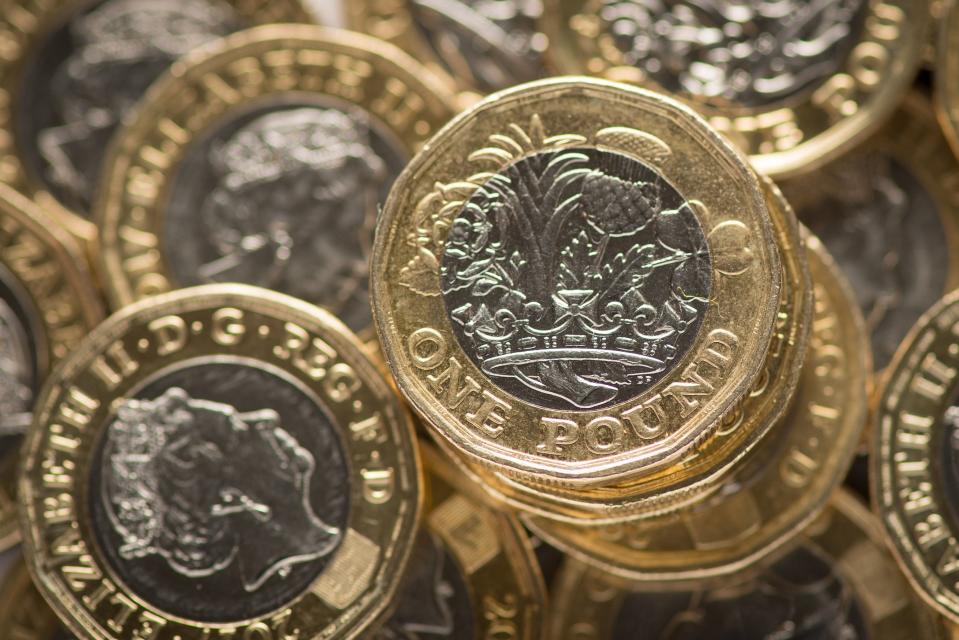
Continued Red Sea attacks mean inflation rate has potential to remain volatile - analyst
07:45 , Matt Mathers
January’s inflation data suggests the rate is returning to its “downward” trend but continued attacks in the Red Sea mean inflation has the potential to remain volatile, an analyst has said.
David Hudson, restructuring advisory partner at FRP, said: “Insolvency levels have been elevated for the past year and, while there is no expectation that those levels will ease anytime soon, any additional input costs and reduced demand linked to rising inflation will only extend that timeline.
“Inflation has the potential to remain volatile – particularly if disruption in the Red Sea begins to have a more significant impact on supply chains. Consumer and materials-dependent sectors like retail, leisure, manufacturing and construction will be ones to watch in the coming weeks.”

‘Stickiness’ of services inflation will concern Bank - analyst
08:02 , Matt Mathers
Commenting on the ONS inflation figures Hetal Mehta, head of economic research at St James’s Place, said: “UK inflation moved sideways in January.
“Whilst the uptick that economists were expecting was avoided, it still remains at double the Bank of England’s 2 percent target.
“What will still be concerning the BoE (Bank of England) is the stickiness of services inflation, especially as it comes on the back of strong wage growth.
“But compared to big upside surprise in US inflation yesterday, today’s UK numbers come as slight relief in relative terms.”
Unchanged inflation rate ‘big challenge for workers'
08:35 , Matt Mathers
Responding to January’s inflation figures Ben Harrison, director of the Work Foundation think tank at Lancaster University, said: “The UK has hit a second minor set-back this year as inflation is struck at 4 per cent, which is unchanged from the previous month, due to higher gas and electricity charges.
“This will present a quandary to Bank of England rate-setters about whether to stick or reduce interest rates as inflation remains double their target.
“And it presents big challenges for workers. Real term pay may have risen this month by 1.4 per cent, but ONS data shows that four in ten adults who pay energy bills are finding it very or somewhat difficult to afford them, and the OBR predicts living standards will be 3.5 per cent lower in 2024-25 than before the pandemic.
“Those in low paid and insecure jobs will be worst impacted by this and among those most vulnerable should inflation remain stuck or if interest rates rise further. This underlines the importance of more action to improve access to better paid, more secure jobs.”

Food and alcohol prices fall
08:43 , Matt Mathers
The monthly drop in food prices, of 0.4 per cent, was the first since September 2021, with the cost of bread and cereals, cream crackers and chocolate biscuits falling, the ONS said.
While food and non-alcoholic beverage prices are still 7 per cent higher than a year ago, the category saw the slowest rate of increase since April 2022.
On a monthly basis, food and non-alcoholic beverage prices fell by 0.4 per cent between December and January.
Most of this drop was down to a 1.3 per cent decrease in bread and cereal prices – the largest in that category since May 2021.

What does inflation rate mean for interest rates?
08:53 , Matt Mathers
The Bank had forecast that inflation would be 4.1 per cent last month, so it might conclude that its measures to combat inflation are working better than previously thought.
Interest rates are currently at their highest levels in 16 years in order to keep a lid on rising prices.
So the surprise figures on Thursday increase the likelihood of the Bank cutting interest rates sometime in the first half of this year, said Samuel Tombs, chief UK economist at Pantheon Macroeconomics.
“We continue to think that CPI outturns over the coming months will convince the (Bank’s Monetary Policy Committee) in the second quarter that monetary policy does not need to be quite as ‘restrictive’ as it is currently, though it looks like a toss-up whether the committee will opt to cut Bank rate for the first time in May or June,” he said.
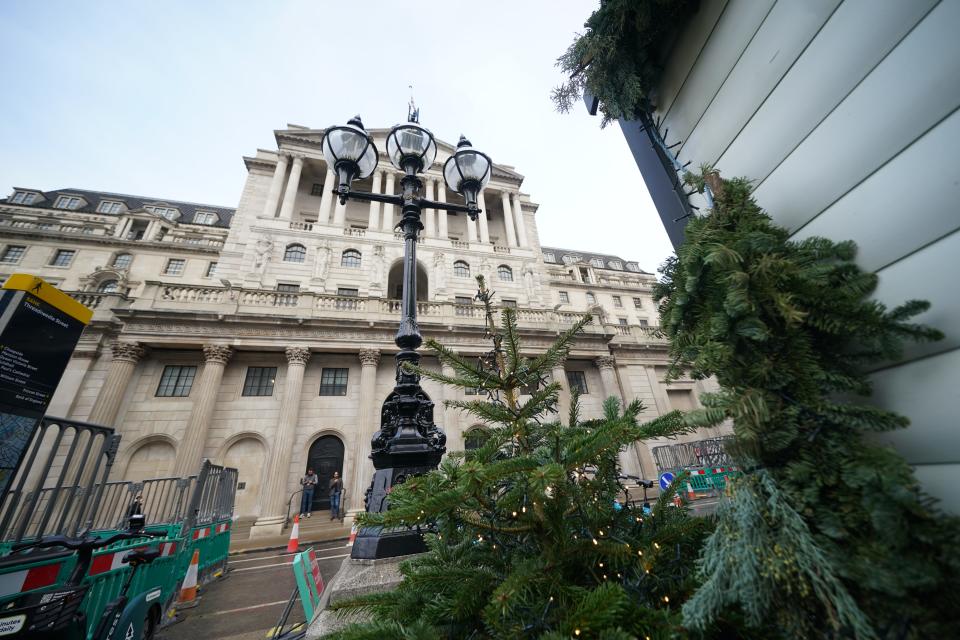
Wages still haven’t caught up with rising prices - union
09:03 , Matt Mathers
Responding to the latest inflation figures, Unite general secretary Sharon Graham said: “Despite all the talk of the cost of living crisis being over, the truth is that prices are not falling and average wages have not caught up.
“Energy costs are still 80 per cent higher than in 2021. Workers must not be made to pay the price for the government’s failure to tackle the rampant profiteering that has been a key driver of this crisis.”
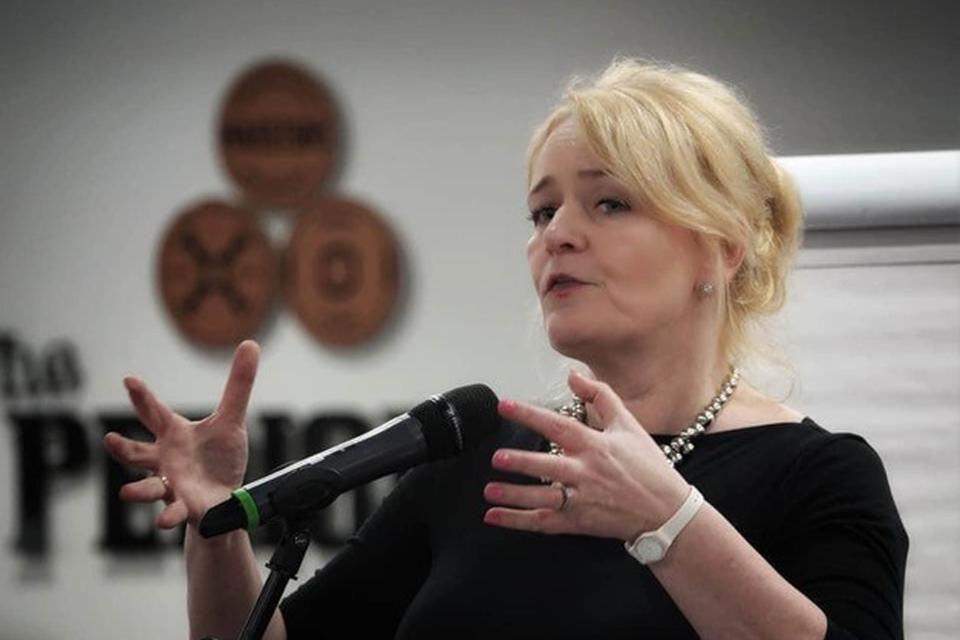
Cost of living crisis isn’t going away - Moneysupermarket
09:39 , Matt Mathers
January’s unchanged inflation figure shows the cost of living crisis “isn’t going away” yet, the Moneysupermarket Group has said.
“With 80 per cent of the population already worried about money and 25 per cent worrying on a daily basis, the news that inflation remains unchanged means millions of families will continue to experience daily money struggles,” Lis Blair, Moneysupermarket Group chief customer officer, said.
“The cost of living crisis isn’t going away, and we shouldn’t underestimate the impact of financial pressures on the nation’s mental health.”
We expect rate cuts in August - S&P Global Ratings
09:46 , Matt Mathers
A leading credit agency has said it doesn’t expect the Bank of England to cut interest rates until August despite January’s better-than-expected inflation numbers.
Marion Amiot, senior European economist at S&P Global Ratings, said: “The latest inflation print is another reflection of what is happening in the labour market: a tight labour supply is sustaining high wage growth and thus underlying inflationary pressures, especially in services.
“That said, recent developments will continue to put inflation on a downward path. Aside from easing energy, food and producer prices, falling vacancies and easing wage pressures are offering positive signs for the Bank of England, that tighter financing conditions are cooling labour demand.
“Much remains to be done to get inflation back to target, so we don’t expect any rate cuts until August.”
Large tax cuts could prolong interest rate pain - accountants
09:56 , Matt Mathers
Large tax cuts in next month’s Budget risk pushing the Bank of England to keep interest rates higher for longer, accountants say.
Suren Thiru, economics director at the Institute of Chartered Accountants in England and Wales, said: “This softer than expected outturn is further evidence that the UK is close to winning its fight against soaring inflation.
“Inflation’s journey back to the Bank of England’s 2 per cent target should now accelerate, with a sizeable fall in energy bills from April and lower food costs likely to drag inflation noticeably lower by the Spring.
“Though core and services inflation remain uncomfortably high, the squeeze from weakening labour demand, slowing wage growth and a struggling economy means they should fall back over this year.
“While interest rates could start falling over the summer, large tax cuts in next month’s budget would risk pushing the Bank of England to keep policy tighter for longer by refuelling concerns over inflation.”

Sunak: Economy has ‘turned the corner'
10:17 , Matt Mathers
The prime minister has insisted the “economy has turned the corner” as he convened the first meeting of his 2024 Business Council.
His comments came after figures showed inflation remained unchanged in January at 4 per cent.
Speaking to chief executives in Downing Street on Wednesday morning, Rishi Sunak said: “I’m absolutely determined to make the UK the best place in the world to start to grow and invest in businesses.
“Of course we’re still battling with lots of global headwinds, not least the Red Sea at the moment, but at the start of this year I absolutely believe that the economy has turned the corner and we’re now pointing in the right direction.”
He continued: “Hopefully that’s something that you’re seeing in your businesses, but inflation has been more than halved from 11 per cent down to 4 per cent, mortgage rates are starting to come down.
“Everyone is predicting us to grow this year.”
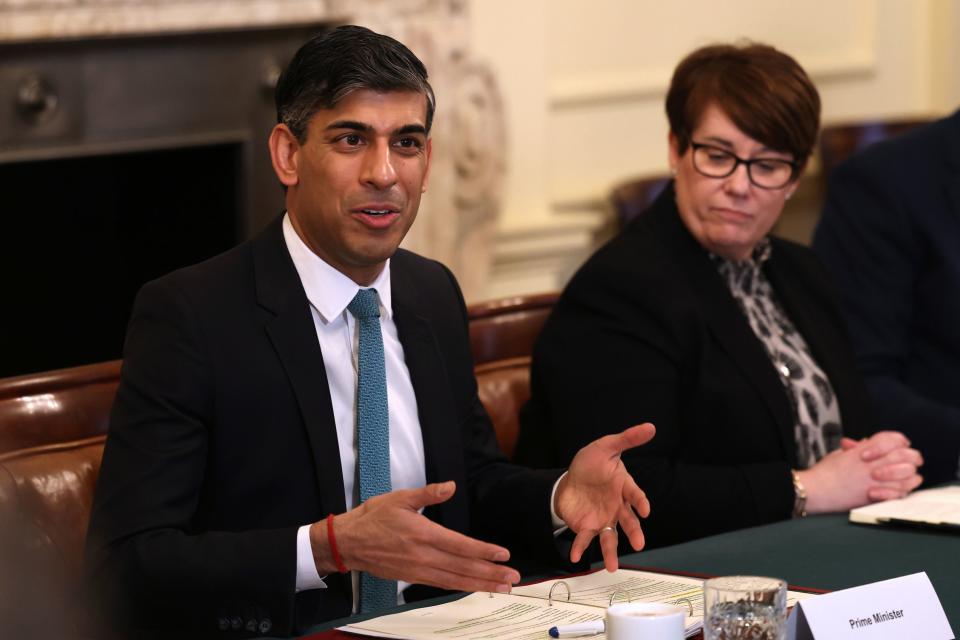
Average UK house price dipped by £4,000 over year to December 2023 – ONS
11:08 , Matt Mathers
The average UK house price fell by around £4,000 in the 12 months to December 2023, according to official figures.
The typical house price in December 2023 was £285,000, marking a 1.4 per cent decline over 12 months, the Office for National Statistics (ONS) said.
Full report:
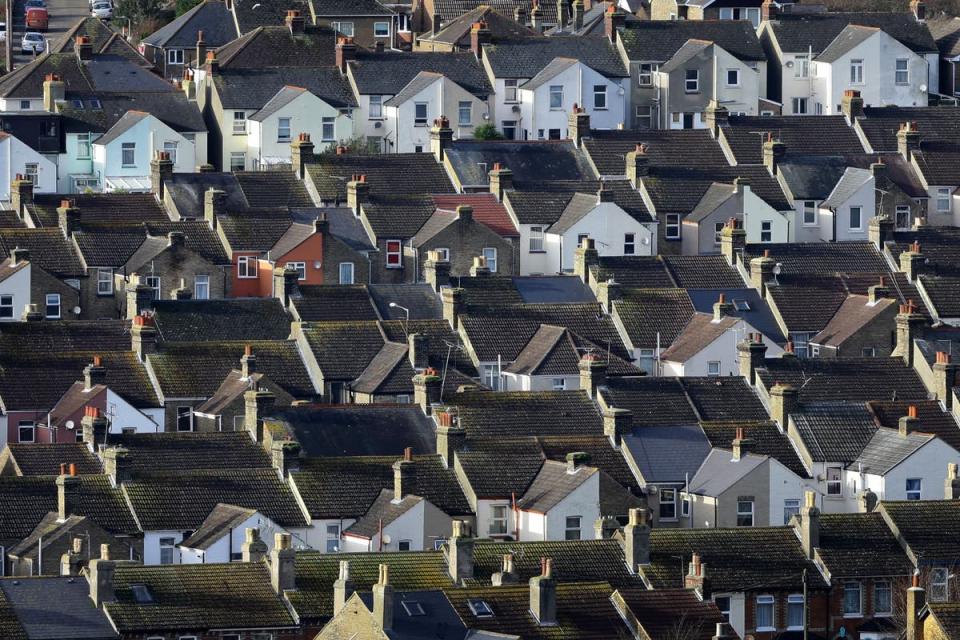
Average UK house price dipped by £4,000 over year to December 2023 – ONS
In full: Economy has turned corner, Sunak tells first meeting of 2024 Business Council
11:43 , Matt Mathers
The prime minister has insisted the “economy has turned the corner” as he convened the first meeting of his 2024 Business Council.
Rishi Sunak labelled himself “unashamedly pro-business” as he delivered some short opening remarks to chief executives in Downing Street on Wednesday morning.
Full report:

Economy has turned corner, Sunak tells first meeting of 2024 Business Council
ICYMI: 2% inflation target will be met in months - chancellor
12:05 , Matt Mathers
Jeremy Hunt has said the Bank of England will meet its inflation target of 2 per cent in a matter of months.
The chancellor said: “Inflation never falls in a perfect straight line, but the plan is working; we have made huge progress in bringing inflation down from 11 per cent, and the Bank of England forecast that it will fall to around 2 per cent in a matter of months.”
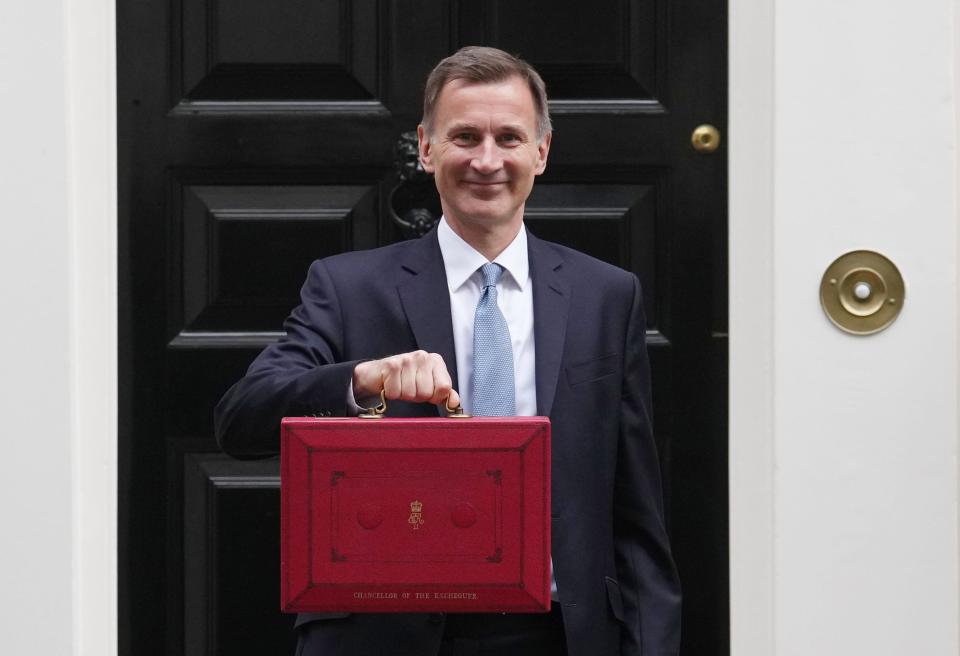
ICYMI: What is inflation?
12:30 , Matt Mathers
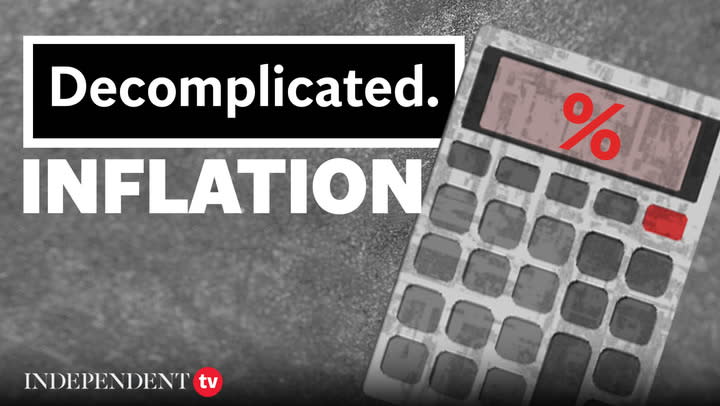
What is inflation? | Decomplicated
What is behind the surprise freeze in inflation and what does it mean for interest rates?
12:50 , Matt Mathers
Inflation unexpectedly remained unchanged last month as food prices fell for the first time in almost two-and-a-half years.
The Office for National Statistics (ONS) said the rate of Consumer Prices Index inflation was 4 per cent in January - unchanged from December. Experts had expected the rate to rise slightly to 4.1 or 4.2 per cent.
But what is inflation, why did it remain unchanged in January and when could the Bank of England start to reduce interest rates?
Full report:

What is behind the freeze in inflation and what does it mean for interest rates?
ICYMI: Falling food and alcohol prices behind unchanged inflation
13:10 , Matt Mathers
The monthly drop in food prices, of 0.4 per cent, was the first since September 2021, with the cost of bread and cereals, cream crackers and chocolate biscuits falling, the ONS said.
While food and non-alcoholic beverage prices are still 7 per cent higher than a year ago, the category saw the slowest rate of increase since April 2022.
On a monthly basis, food and non-alcoholic beverage prices fell by 0.4 per cent between December and January.
Most of this drop was down to a 1.3 per cent decrease in bread and cereal prices – the largest in that category since May 2021.

